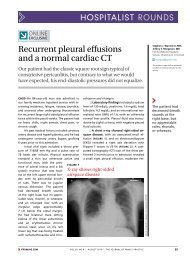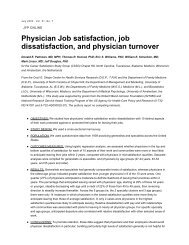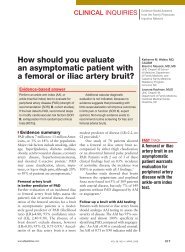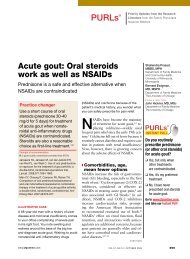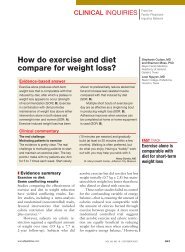Clinical Inquiries - The Journal of Family Practice
Clinical Inquiries - The Journal of Family Practice
Clinical Inquiries - The Journal of Family Practice
You also want an ePaper? Increase the reach of your titles
YUMPU automatically turns print PDFs into web optimized ePapers that Google loves.
findings as well as subjective symptoms in<br />
acute sinusitis using phenoxymethyl-penicillin<br />
(penicillin V) in combination with oxymetazoline<br />
or placebo administered via a variety <strong>of</strong><br />
nasal delivery systems. 3 Oxymetazoline was not<br />
significantly different from placebo. Controlled<br />
prospective studies are lacking to support the<br />
use <strong>of</strong> decongestants in acute sinusitis.<br />
■ RECOMMENDATIONS FROM OTHERS<br />
Expert opinion from Current <strong>Clinical</strong> Topics in<br />
Infectious Diseases does not recommend the<br />
use <strong>of</strong> decongestants in sinusitis or the common<br />
cold in the absence <strong>of</strong> concurrent allergic rhinosinusitis.<br />
4 This recommendation is based on<br />
the lack <strong>of</strong> evidence regarding efficacy and the<br />
known rebound congestion associated with topical<br />
decongestants. If a decongestant is prescribed,<br />
the oral route is preferred, with the<br />
understanding <strong>of</strong> potential significant side<br />
effects <strong>of</strong> nervousness, insomnia, tachycardia,<br />
and hypertension.<br />
Ginger Allen, MD, Valley Medical Center, Seattle, Wash;<br />
Gary Kelsberg, MD, University <strong>of</strong> Washington/Valley<br />
Medical Center, Seattle; Terry Ann Jankowski, MLS,<br />
AHIP, University <strong>of</strong> Washington Health Sciences Libraries,<br />
Seattle<br />
■ CLINICAL COMMENTARY<br />
Decongestants can do<br />
more harm than good<br />
Never one to have been impressed with most <strong>of</strong><br />
the current symptomatic treatments available<br />
for the common cold, I have for years been<br />
amazed at how quick the public is to purchase<br />
and repeatedly use these products.<br />
While a judicious course <strong>of</strong> decongestants<br />
can ease the congestion, when misused they<br />
<strong>of</strong>ten cause significant harm and discomfort<br />
that is difficult to resolve. Patients whom I<br />
have assisted through successful discontinuance<br />
<strong>of</strong> topical nasal decongestants are among<br />
the most appreciative in my practice.<br />
Russell W. Roberts, MD, Louisiana State University<br />
Health Sciences Center, Shreveport<br />
722 SEPTEMBER 2003 / VOL 52, NO 9 · <strong>The</strong> <strong>Journal</strong> <strong>of</strong> <strong>Family</strong> <strong>Practice</strong><br />
CLINICAL INQUIRIES<br />
REFERENCES<br />
1. Taverner D, Bickford L, Draper M. Nasal decongestants for<br />
the common cold. Cochrane Database Syst Rev<br />
2000;(2):CD001953. Updated quarterly.<br />
2. Inanli S, Ozturk O, Korkmaz M, Tutkun A, Batman C. <strong>The</strong><br />
effects <strong>of</strong> topical agents <strong>of</strong> fluticasone propionate, oxymetazoline,<br />
and 3% and 0.9% sodium chloride solutions on<br />
mucociliary clearance in the therapy <strong>of</strong> acute bacterial rhinosinusitis<br />
in vivo. Laryngoscope 2002; 112:320–325.<br />
3. Wiklund L, Stierna P, Berglund R, Westrin KM, Tonnesson<br />
M. <strong>The</strong> efficacy <strong>of</strong> oxymetazoline administered with a nasal<br />
bellows container and combined with oral phenoxymethylpenicillin<br />
in the treatment <strong>of</strong> acute maxillary sinusitis. Acta<br />
Otolaryngol Suppl 1994; 515:57–64.<br />
4. Chow AW. Acute sinusitis: current status <strong>of</strong> etiologies, diagnosis,<br />
and treatment. Curr Clin Top Infect Dis 2001; 21:31–63.<br />
Is screening for lead<br />
poisoning justified?<br />
■ EVIDENCE-BASED ANSWER<br />
Evidence is insufficient to recommend for or<br />
against universal screening <strong>of</strong> young children for<br />
lead poisoning in high-prevalence communities<br />
(strength <strong>of</strong> recommendation [SOR]: C). In lowprevalence<br />
communities, evidence is insufficient<br />
to recommend for or against a targeted screening<br />
approach, employing locale-specific demographic<br />
risk factors and personal risk questionnaires to<br />
inform screening decisions (SOR: C).<br />
Although evidence does not suggest that treatment<br />
<strong>of</strong> individuals with elevated blood lead levels<br />
improves individual outcomes, public health<br />
strategies aimed at decreasing lead in the environment<br />
appear to have resulted in a significant<br />
decline in the number <strong>of</strong> children with elevated<br />
blood lead levels in recent decades. One could<br />
thus argue that screening may identify communities<br />
with high rates <strong>of</strong> lead poisoning, where<br />
environmental strategies could be targeted.<br />
Because the epidemiology <strong>of</strong> lead poisoning<br />
continues to change, local and state health<br />
authorities must continuously update information<br />
on which to base decisions about screening.<br />
■ EVIDENCE SUMMARY<br />
<strong>The</strong> prevalence <strong>of</strong> elevated blood lead levels<br />
varies widely among different demographic



